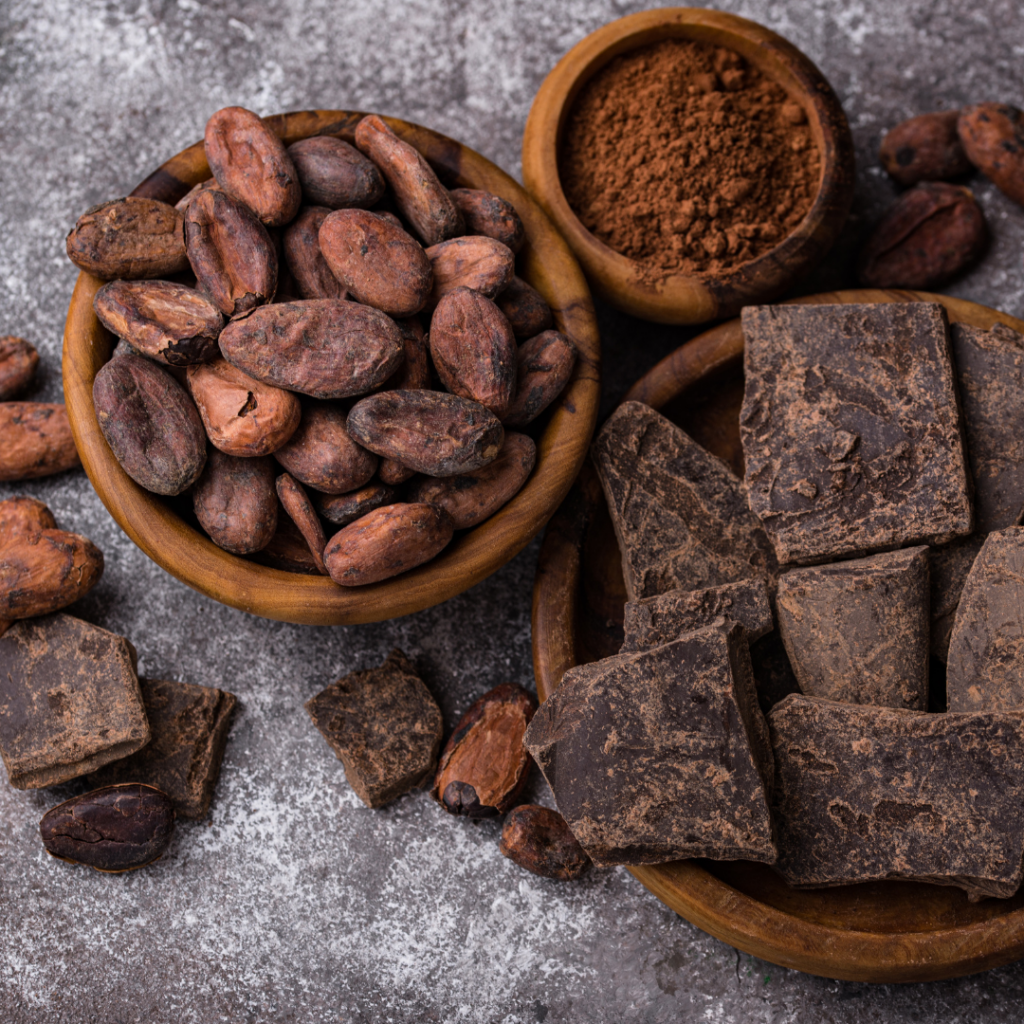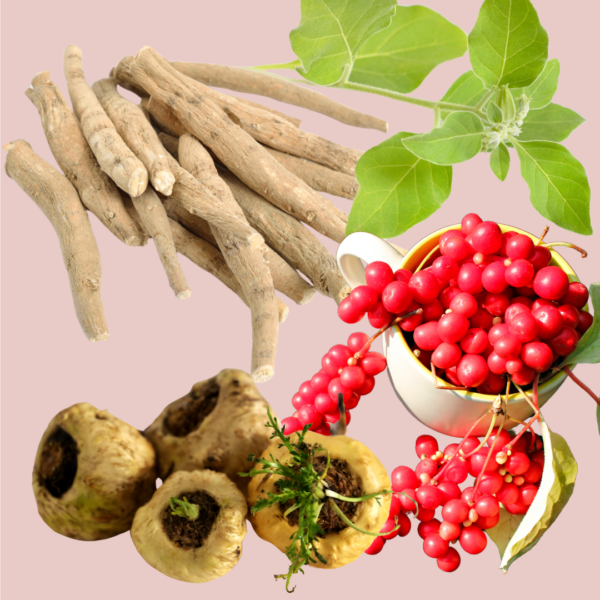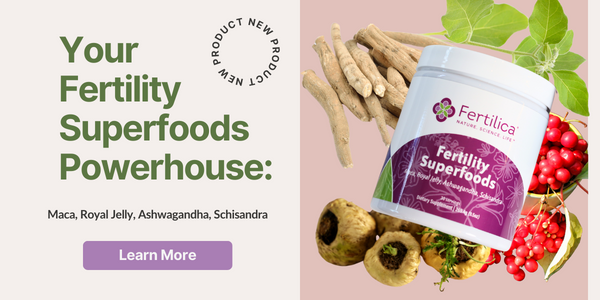Fertility superfoods are gaining attention for their potential to enhance reproductive health and hormone balance. And in more recent years science has begun to back up these benefits.
In this guide I am going to share with you how to use fertility superfoods as part of a holistic approach for hormone balance, stress management, and fertility support.
Fertility superfoods and tonics like Ashwagandha, Cinnamon, and Maca are known for their hormone-balancing properties. Adaptogens, such as these, support the endocrine system and help maintain hormonal balance, which is vital for fertility.
However, finding these benefits in food sources can be rare so supplementation will be the easiest way to consistently get them. I will cover the best supplement for this as well.
Quick Guide to Superfoods for Fertility
- Maca Root: Enhances libido, endurance, hormonal balance, and fertility.
- Royal Jelly: Known for its fertility-enhancing properties and support for reproductive health.
- Schizandra Berry: Aids in stress management, liver health, and hormonal harmony.
- Ashwagandha Root: Reduces stress and benefits sperm and overall reproductive health.
- Cinnamon Bark: Helps with blood sugar balance, which is important for hormonal health.
- Cacao Bean: Offers antioxidant properties and mood enhancement.

Maca Root
Maca root, traditionally grown in the Andes of Peru, is renowned for its ability to enhance fertility and sexual health. Its history as a medicinal plant dates back thousands of years, used by indigenous people to boost stamina, energy, and sexual function.
Maca is rich in essential minerals like iodine, iron, and magnesium, which are crucial for hormonal balance and reproductive health. It is believed to regulate hormone levels without containing hormones itself, making it beneficial for both men and women.
Hormone Health and Estrogen Balance
Maca root is celebrated for its capacity to support hormone health, including the balance of estrogen levels. It contains plant sterols that stimulate the endocrine system, aiding in the maintenance of hormonal equilibrium. This unique mechanism of action distinguishes maca from other supplements that might target specific hormones.
Instead, maca supplementation supports the overall functioning of the hypothalamus and pituitary glands, which are central to regulating the endocrine system. This helps to stabilize fluctuating hormone levels.
Libido Enhancement
Both men and women may experience an increase in libido with the consumption of maca root. This because maca is a nutrient-dense root, which includes essential minerals and compounds that contribute to overall vitality and sexual health.
For women, maca’s impact on libido is closely linked to its hormone-balancing properties, offering a natural way to enhance sexual desire without the use of synthetic hormones. Many of our customers have attested to this benefit.

Support for Men with Sperm Quality and Libido
Maca root has shown promising results in improving sperm quality and libido in men. Studies indicate that maca can increase sperm concentration and motility, which are key factors in male fertility.
Additionally, maca’s ability to boost libido extends to men, providing a dual benefit for couples trying to conceive. The improvement in sexual desire coupled with enhanced sperm quality, underscores maca’s potential as a supportive supplement for male reproductive health.
Adaptogenic Properties
One of the remarkable features of maca root is its adaptogenic nature. Adaptogens are substances that help the body adapt to stress and exert a normalizing effect upon bodily processes.
Maca’s adaptogenic qualities mean it can help mitigate the effects of stress on the body, including stress-related hormonal imbalances. By supporting the adrenal function and reducing cortisol levels, maca helps maintain a healthy hormonal balance, which is crucial for fertility and overall reproductive health.
Nutritional Support
Maca root is rich in essential nutrients that play a role in supporting reproductive health. It contains vitamins, minerals, amino acids, and other compounds that contribute to its overall health benefits.
These nutrients not only support hormonal balance but also provide energy, enhance endurance, and support a healthy immune system, all of which are beneficial for individuals looking to improve their fertility and reproductive health.
How To Get Maca Into Your Diet
Whether dealing with hormonal imbalances, wanting to boost libido, maca root presents a natural, holistic option every woman should consider taking regularly. Maca powder is one of the main ingredients in our Fertilica Fertility Superfood Blend. You can also find it in capsules here.
Royal Jelly
Royal Jelly is a unique, nutrient-packed substance produced by honeybees, primarily to feed the queen bee and her larvae.
It has a remarkable mix of proteins, fats, vitamins, and minerals. This makes it a strong supplement for boosting fertility and reproductive health.
Nutritional Profile and Fertility Benefits
Royal Jelly’s nutritional richness contributes significantly to its fertility-enhancing properties. It contains a variety of B vitamins, amino acids, fatty acids, minerals, and a unique compound known as royalactin.
Royalactin is believed to be responsible for the incredible fertility and longevity of the queen bee, suggesting potential benefits for human fertility as well.

Hormonal Regulation and Ovarian Function
One of the most intriguing aspects of Royal Jelly is its potential to improve hormonal balance and ovarian function. It has been shown to mimic human estrogen, which can be particularly beneficial for women experiencing hormonal imbalances.
By supporting the regulation of estrogen levels, Royal Jelly may help in improving menstrual regularity, enhancing egg quality, and increasing the chances of successful conception.
Supporting Male Fertility
While most of the focus on Royal Jelly’s fertility benefits has been on women, preliminary research suggests it may also support male fertility. Its rich nutritional content can contribute to improved sperm health, potentially increasing sperm count and motility.
This makes Royal Jelly a valuable supplement for couples looking to enhance their fertility naturally.
Antioxidant Properties
Royal Jelly’s antioxidant properties further contribute to its fertility benefits. Antioxidants help combat oxidative stress, a factor known to negatively affect reproductive health.
By reducing oxidative damage, Royal Jelly protects egg and sperm cells, thereby supporting healthier conception outcomes.
How To Get Royal Jelly Into Your Diet
Integrating Royal Jelly into your daily diet can be done through supplementation or directly consuming the substance in its natural form. Royal Jelly is one of the main superfoods in our Fertilica Fertility Superfoods blend. You can also find it in capsules. Royal jelly is produced by bees so avoid it if you have a known bee allergy.
Schizandra Berry
Schizandra is a berry that has been used for centuries in Traditional Chinese Medicine. It has a wide range of health benefits, including its potential to support reproductive health and fertility.
It’s adaptogenic properties make it particularly effective in helping the body resist the effects of stress. Recent studies have shown stress can negatively impact fertility in both men and women.

Stress Management
Schizandra’s adaptogenic qualities help support the body’s response to stress. They do this by restoring the normal production and release of stress hormones like cortisol.
By reducing stress levels, schizandra can improve the overall environment for conception.
Studies show that hormonal imbalances caused by high cortisol levels can worsen the age-related infertility. Stress can stop the LH surge needed for ovulation. This causes anovulatory cycles.
Cortisol can also impact the luteal phase of the menstrual cycle. Elevated cortisol can affect egg health, ovulation, and lower progesterone.
Another study found that women with higher levels of alpha-amylase, an indicator of stress, had a 2-fold increased risk of infertility compared to participants with lower levels.
As we can see, managing stress and it’s affects on the body is of the upmost importance. Schizandra is great for this.
Liver Health and Hormonal Balance
The liver plays a crucial role in regulating hormones, including those involved in reproduction. Schizandra supports liver function, which in turn helps maintain hormonal balance.
A well-functioning liver can effectively metabolize excess hormones, which is essential for regular menstrual cycles in women and healthy sperm production in men.
Endocrine System Support
Schizandra has a positive impact on the endocrine system, which is responsible for hormone production and regulation. Schizandra can aid in polycystic ovary syndrome (PCOS) and other hormonal imbalances that can affect fertility.
Antioxidant Properties
Schizandra berries are rich in antioxidants, which protect cells from oxidative stress. Oxidative stress can lead to cellular damage, including damage to egg and sperm cells.
By reducing oxidative stress, schizandra supports egg health, which is vital for successful conception and healthy pregnancy.
How to Get Schizandra Into Your Diet
Schizandra can be found in the correct therapeutic amounts in Fertilica Fertility Superfoods blend.
In short, schizandra offers many benefits for reproductive health. These include stress relief and support for liver and hormonal balance. It also offers antioxidant protection. These properties make it a valuable natural option for those looking to support fertility and overall reproductive well-being.
Aswagandha Root
Ashwagandha, known scientifically as Withania somnifera, is a powerful adaptogen revered in Ayurvedic medicine for its ability to enhance vitality and reduce stress. Its benefits for reproductive health are man for both male and female fertility.

For Female Fertility
In women, Ashwagandha promotes hormonal balance. It also supports thyroid function and reproductive health. The thyroid gland plays a pivotal role in regulating menstrual cycles and fertility. Ashwagandha’s adaptogenic properties help manage stress. This is vital because stress can cause menstrual issues and hurt ovulation.
For Male Fertility
Ashwagandha has been shown to significantly improve sperm quality by increasing sperm count, motility, and morphology. A study published in the journal “Evidence-Based Complementary and Alternative Medicine” found that Ashwagandha supplementation led to a considerable improvement in semen parameters in men dealing with stress-related infertility.
Ashwaagandha works by reducing oxidative stress, a common cause of sperm damage. It also can enhance testosterone levels, which is crucial for sperm production.
Stress Reduction
Ashwagandha’s most celebrated benefit is its ability to reduce stress. This is directly linked to better reproductive health. Chronic stress can lead to an imbalance in cortisol levels, affecting the body’s hormonal balance and fertility.
Research has found that constant stress can affect your chances of getting pregnant. When you’re stressed, your body makes more of a hormone called cortisol. This hormone negatively affects hormone balance. For example, too much cortisol can stop the body from ovulating regularly. It can also affect egg and sperm health.
Another study found that women with higher levels of a stress marker in their saliva were twice as likely to experience infertility.
Ashwagandha helps in regulating cortisol levels, thereby reducing stress and creating a positive impact on fertility.
Antioxidant Properties
Ashwagandha is rich in antioxidants, which protect the cells from oxidative stress and damage. This is particularly beneficial for fertility, as oxidative stress can negatively affect both egg and sperm quality.
By combating oxidative stress, Ashwagandha supports the health of reproductive cells, enhancing fertility.
Incorporation into Daily Diet
Ashwagandha can be incorporated into day, in the correct therapeutic amounts by taking our Fertilica Fertility Superfoods blend.
In conclusion, Ashwagandha offers a holistic approach to enhancing fertility and supporting reproductive health. Its adaptogenic, stress-reducing, and antioxidant properties make it a valuable supplement for those trying to conceive, providing support for both men and women on their fertility journey.
Cinnamon Bark
Cinnamon bark, a common kitchen spice, has been identified as a potent ally in the quest for improved fertility and hormonal health.
Its impact on blood sugar balance and insulin resistance is particularly beneficial for women with PCOS (Polycystic Ovary Syndrome), a condition that can interfere with ovulation and menstrual regularity.

Blood Sugar Regulation and Hormonal Health
Cinnamon’s ability to regulate blood sugar is crucial for hormonal balance. Insulin resistance, a condition where the body’s cells become less responsive to insulin, can lead to elevated insulin levels. These high levels can disrupt the delicate balance of reproductive hormones, contributing to fertility issues.
Cinnamon helps improve insulin sensitivity, which can stabilize hormonal levels and aid in regular ovulation and menstrual cycles.
PCOS and Fertility
For women with PCOS, cinnamon’s influence on insulin resistance offers hope. By improving the body’s response to insulin, cinnamon can help lower the risk of the metabolic disturbances that often accompany PCOS. This, in turn, may improve the chances of ovulation and conception.
Antioxidant Properties
Cinnamon is also rich in antioxidants, which protect the body’s cells from damage caused by free radicals. This antioxidant activity is beneficial for reproductive health, as it can protect egg and sperm cells from oxidative stress, potentially improving fertility outcomes.
Additional Reproductive Health Benefits
Beyond its effects on blood sugar and insulin resistance, cinnamon has been found to offer other reproductive health benefits:
- Menstrual Support: Cinnamon may help alleviate menstrual cramps and manage heavy menstrual bleeding, providing natural relief during the menstrual cycle.
- Libido Enhancement: There is some evidence to suggest that cinnamon can boost libido, which is an important aspect of fertility for both men and women.
- Anti-inflammatory Effects: The anti-inflammatory properties of cinnamon can be beneficial for conditions like endometriosis, which can affect fertility.
Incorporating Cinnamon into Your Diet
Adding cinnamon to your diet is simple. It can be sprinkled on oatmeal, added to smoothies, or used in baking to provide a warm, sweet flavor. For those looking to specifically target fertility and hormonal health, a daily intake of cinnamon in moderation is recommended. This can easily be accomplished in therapeutic amounts through our Fertilica Fertility Superfoods Blend.
Cinnamon bark is more than just a flavorful addition to your pantry; it’s a powerful tool for enhancing fertility and promoting hormonal health. Its ability to balance blood sugar and improve insulin sensitivity makes it particularly valuable for women with PCOS, while its antioxidant and anti-inflammatory properties support overall reproductive well-being.
Cacao Bean
Cacao bean, particularly in the form of dark chocolate, is a treasure trove of nutrients and antioxidants. This makes it a great addition to your fertility diet. Its rich content of flavonoids. These include epicatechin, catechin, and procyanidins, which play a crucial role in protecting cells from oxidative damage.
These antioxidant properties are particularly beneficial for egg health and sperm quality.

Nutrient-Rich Profile for Hormonal Balance
Cacao is packed with essential minerals like magnesium, iron, and zinc, which are vital for hormonal balance. Magnesium, for instance, is necessary for a healthy stress response and relaxation. Iron is crucial for ovulation and endometrial lining thickness. Zinc plays a significant role in egg and sperm health.
Mood Enhancement and Stress Reduction
The mood-enhancing properties of cacao, attributed to compounds like phenylethylamine, can be helpful as well. Stress is a known barrier to fertility, and a little bit of cacoa daily can help with this.
Cacao also contains tryptophan, a precursor to serotonin helps to improve your mood and reduce stress.
Additional Reproductive Health Benefits
Beyond its antioxidant properties and nutrient content, cacao offers several other benefits for reproductive health:
- Enhances Glucose Metabolism: Improved insulin sensitivity due to cacao consumption may help lower insulin resistance, a common issue in conditions like PCOS that can affect regular ovulation.
- Alleviates PMS Symptoms: The nutrients in cacao can ease symptoms associated with premenstrual syndrome, making it a comforting choice for women experiencing menstrual discomfort.
Incorporating Cacao into Your Fertility Diet
Adding cacao to your diet is simple and delicious. Opt for dark chocolate with a high cacao content (70% or higher) to maximize its health benefits. Cacao can also be enjoyed as nibs, powder, or raw beans, mixed into smoothies, yogurts, or homemade treats.
For an optimal fertility boost, get your daily dose of cacao with all of the most important fertility superfoods like maca, in therapeutic amounts through our Fertilica Fertility Superfoods Blend.
Incorporating these superfoods into a balanced diet on a daily basis is important to get the full benefits…
That is why I created Fertilica Fertility Superfoods Blend. This powdered formula contains all of the most important superfoods and tonics for fertility and hormone health.
Fertility superfoods and tonics need to be taken on a daily basis gain the benefits. It provides the daily recommend dosage for each of the superfoods in the formula. This blend is potent.
Incorporating Fertility Superfoods into your daily routine is a delightful and nourishing way to support your reproductive health.
Fertilica Fertility Superfoods can be easily blended with plant milk or water to create a smooth, delicious beverage.
For a quick and efficient mix, use a hand electric mixer or shaker bottle.
Fertility Superfoods can also be a tasty addition to your favorite smoothies, enhancing them with a chocolaty malt flavor that you’ll eagerly anticipate each morning.
Remember, consistency is key when it comes to reaping the benefits of these superfoods. Make them a part of your daily diet to support your body’s natural fertility.
Ready to enhance your fertility journey with the power of superfoods? Visit the Fertilica Fertility Superfoods page to learn more and start integrating these potent ingredients into your daily routine. Embrace the holistic approach to fertility and take the first step towards a healthier, more balanced reproductive system today!
- https://www.ncbi.nlm.nih.gov/pmc/articles/PMC3614604/
- https://www.ncbi.nlm.nih.gov/pmc/articles/PMC7812464/
- https://www.webmd.com/sex-relationships/the-truth-about-maca
- https://www.ncbi.nlm.nih.gov/pmc/articles/PMC3614647/
- https://www.ncbi.nlm.nih.gov/pmc/articles/PMC6494062/
- https://hormonesbalance.com/articles/the-10-hormone-balancing-wonders-of-maca/
- https://www.ncbi.nlm.nih.gov/pmc/articles/PMC2928177/
- https://www.gaiaherbs.com/blogs/seeds-of-knowledge/maca-benefits-for-women
- https://www.thevegannutritionist.co.uk/benefits-of-maca
- https://www.rupahealth.com/post/the-benefits-of-maca-root-in-hormonal-regulation-and-menopausal-symptom-relief
- https://www.geneticlifehacks.com/maca-root-benefits-how-it-works/
- https://www.medicalnewstoday.com/articles/322511
- https://longevity.technology/lifestyle/6-ways-maca-promotes-hormonal-balance-in-men-and-women/amp/
- https://www.healthline.com/nutrition/benefits-of-maca-root
- https://pharmeasy.in/blog/benefits-of-maca-root-for-females-research-backed-insights-into-its-effectiveness/
- https://www.ncbi.nlm.nih.gov/pmc/articles/PMC5641457/
- https://ro.co/fertility/royal-jelly-fertility/
- https://pubmed.ncbi.nlm.nih.gov/31916638/
- https://natural-fertility-info.com/royal-jelly.html
- https://www.mdpi.com/2076-3921/10/3/336
- https://www.ncbi.nlm.nih.gov/pmc/articles/PMC10344356/
- https://www.marchofdimes.org/find-support/topics/pregnancy/stress-and-pregnancy
- https://elara.care/hormones/how-cortisol-affects-womens-health-and-the-menstrual-cycle/
- https://www.ncbi.nlm.nih.gov/pmc/articles/PMC5632691/
- https://www.ncbi.nlm.nih.gov/pmc/articles/PMC3863556/
- https://www.ncbi.nlm.nih.gov/pmc/articles/PMC5833251/
- https://www.healthline.com/health/does-ashwagandha-make-you-fertile
- https://www.ncbi.nlm.nih.gov/pmc/articles/PMC9745082/
- https://www.ncbi.nlm.nih.gov/pmc/articles/PMC2901047/
- https://pubmed.ncbi.nlm.nih.gov/17296187/
- https://www.ncbi.nlm.nih.gov/pmc/articles/PMC8502340/
- https://pubmed.ncbi.nlm.nih.gov/29250843/






